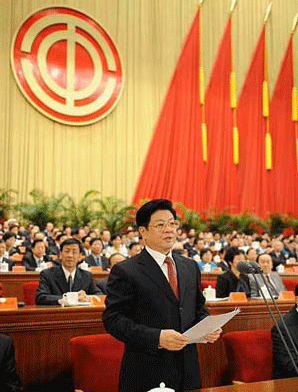Chinese president Xi Jinping on Wednesday urged the new leadership of the All-China Federation of Trade Unions (ACFTU) to both safeguard the rights of workers and reinforce the Communist Party’s influence over China’s only umbrella union. From Xinhua News:
The unions should resolve the practical problems closest to workers’ interests and which they care about most, he said.
Xi also urged unions to adhere to the tradition of put itself under the leadership of the Communist Party.
The job of China’s workers’ movement is to strive for the collective Chinese dream of national rejuvenation, he said.
The working class is a reliable and firm foundation for the CPC and a primary force in building a moderately prosperous society. China should combine each worker’s personal desires with the national dream and mobilize all workers to contribute, he said. [Source]
The Diplomat’s Tyler Roney writes that despite apparent words of reform from Xi, premier Li Keqiang and state-run media, doubts persist as to whether China’s trade unions will liberalize:
The ACFTU is the largest union in the world, with Xinhua reporting over 280 million members; it’s also one of the weakest in representing their members, existing primarily to serve the CCP, convey its messages and policies to the workers, and spread the “mass line.” In fact, all other trade unions unaffiliated with the ACFTU are illegal. Crothall says, “At the factory of workplace level, most trade unions are basically controlled directly or indirectly by management and they don’t really represent workers’ interests.”
That said, as the country’s main and only legal labor union is government controlled, workers are stuck putting pressure directly on their employers—which often results in bad PR for the PRC.
There is no chance that the ACFTU is going to taper off or that the government is ever going to allow individual, unaffiliated trade unions on the mainland, but if workers on the ground can get mobilized, there is a bit of hope that the workers will be able to take matters into their own hands. Crothall says, “Rather than looking at what is happening in Beijing, we look at what’s happening on the factory floor, and there you can see some encouraging signs in terms of workers demanding better union representation.” [Source]








